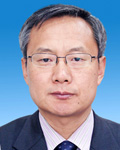
Zhang Weiwei (Director of the Center for China Development Model Research, Fudan University): Over the past three decades, there have been various predictions, optimistic and pessimistic, about China. It is interesting that the pessimists have all been proved wrong, and the optimists have almost always been correct. Why? Because the pessimists have misjudged the general trend of China's development.
What is this general trend? Readers will find the answer in the book. It is as follows: to proceed from a goal of serving the long-term interests of the Chinese people, to continue reforms to a deeper level, to realize the Chinese dream, to modernize China's "national governance system and capability," and to ensure the success of "socialism with Chinese characteristics."
One important feature of Xi's governance is that he knows what the people think and want, and focuses on key points to benefit the whole situation and boost all-round progress in China. This book shows readers the broad blueprint, drawn under Xi's supervision, of reforms. This not only helps readers understand what reforms are ongoing in China, but also how the CPC makes decisions.
In the book, one will find many of Xi's views on governance, including those on the relationships among reform, development and stability, among reforms of political, economic and social structures, between the Central Government and localities, and between domestic affairs and diplomatic relations. This will help readers understand the general trend of China's path to development and its underlying concepts.
Xi is a person who views the world from the standpoint of China, and China from a global perspective. Having visited almost 100 countries, he has gained a broad international vision that has given him a precise understanding of his country's global orientation. He holds that China should make greater contributions to the world's development, and that all countries in the world should form a "community of shared destiny."
This book acquaints readers with Xi's major views on relations between China and the rest of the world. For instance, he has raised a number of ideas on foreign policy based on traditional Chinese culture. One is his advocacy of neighborhood diplomacy characterized by "friendship, sincerity, reciprocity, and inclusiveness." Another is his insistence that China takes a correct and more balanced approach to its obligations and interests in foreign relations. He has also made proposals such as building "a new model of major-country relationship" between China and the United States, the Silk Road Economic Belt, and the 21st Century Maritime Silk Road.

Sun Yeli (a research fellow with the Party Literature Research Office of the CPC Central Committee): Due to profound changes in China's economic and social life and the evolution of the public mindset, people from different regions, social strata and fields of endeavor naturally do not think alike. Discord could undermine development, and therefore establishing consensus is a pressing need. To find consensus, the most important task is to identify a common goal. Since the 1840s, the Chinese people have striven toward and made sacrifices for one goal—the renewal of the Chinese nation. This dream resonates in every Chinese heart and has become the common aspiration of all the Chinese in and outside the country.
Reform represents a bridge to our dreams. The book presents Xi's overall vision of reform, and the particularities of how it will impact on China's economy, politics, culture, society, ecology and national defense. China finds itself confronted by a series of challenges, such as unbalanced and unsustainable development, drawbacks in scientific and technological innovation, a sub-optimal industrial structure, rising social problems, gaps between rural and urban development, income disparities, and rampant corruption. If these problems are not solved, development will be hampered, and the Chinese dream will remain elusive.
Seven articles present Xi's thinking and policy measures on improving government officials' work conduct and combating corruption. Dozens of corrupt officials at the ministerial level or above have fallen from power, and serious cases are currently under investigation. Xi has vowed to have "power being 'caged' by the system," underlining the need to construct a system to restrict the exercise of power and subject it to public scrutiny.
Email us at: yanwei@bjreview.com |
